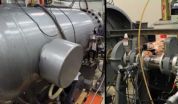(Press-News.org) Reducing fear and stress following a traumatic event could be as simple as providing a protein synthesis blocker to the brain, report a team of researchers from McLean Hospital, Harvard Medical School, McGill University, and Massachusetts General Hospital in a paper published in the March 4 issue of Proceedings of the National Academy of Sciences.
"This is an important basic neuroscience finding that has the potential to have clinical implications for the way individuals with posttraumatic stress disorder are treated," said Vadim Bolshakov, PhD, director of the Cellular Neurobiology Laboratory at McLean Hospital. "We used a well known behavioral paradigm that we think models PTSD, fear conditioning, to explore how fearful memories are formed. In our study, the level of fear exhibited by experimental subjects was significantly reduced as a result of decreased signal transfer between cells in the amygdala, a key brain region in fear-related behaviors."
Influenced by the original findings of Karim Nader, PhD, professor of Psychology at McGill University, whose pioneering work showed that old memories should be un-stored in their brain after their recollection in order to last, Bolshakov's team exposed rats to auditory stimulus that the animals learned to associate with a mildly traumatic event. After a single exposure to the training procedures, the rats exhibited fear during subsequent exposures to auditory stimuli. The researchers then provided the animals with rapamycin, a protein synthesis blocker, immediately after memory was retrieved in order to control bonding between the cells in the brain. The animals exhibited significantly less fear in response to the fear-invoking stimulus when retested the next day.
"The animals showed stereotypical signs of fear after the initial exposure to the auditory stimulus," explained Nader, a co-author on the paper. "Following the administration of rapamycin, we show a significant decrease in fear, but not a complete elimination. We were surprised to note that activity between cells was significantly affected by postsynaptic mechanisms."
The findings of this study, which was funded by a grant from the United States Department of Defense spearheaded by Roger Pitman, suggest that different plasticity rules within cells in the brain are recruited during the formation of the original fear memory and after fear memory was reactivated.
"Although further work at the molecular level needs to be completed, we are hopeful that this unexpected discovery is the foundation needed to identify ways in which we can better treat anxiety disorders in which fear condition plays a role, such as post traumatic stress disorder," said Bolshakov.
INFORMATION:
Additional authors on this study include McLean Hospital's Yan Li, PhD, Edward Meloni, PhD, William Carlezon, PhD, and Mohammed Milad and Roger Pitman, MD, of Massachusetts General Hospital.
McLean Hospital is the largest psychiatric affiliate of Harvard Medical School and a member of Partners HealthCare. For more information about McLean, visit http://www.mclean.harvard.edu or follow the hospital on Twitter@McLeanHospital.
Founded in Montreal, Quebec, in 1821, McGill is a leading Canadian post-secondary institution. It has two campuses, 11 faculties, 11 professional schools, 300 programs of study and some 38,000 students, including 8,800 graduate students. McGill attracts students from over 150 countries around the world, with more than 7,700 international students making up 20 per cent of the student body. Almost half of McGill students claim a first language other than English, including more than 6,700 with French as their first language.
More news from McGill University: http://www.mcgill.ca/newsroom/
END
Women who receive strong social support from their families during pregnancy appear to be protected from sharp increases in a particular stress hormone, making them less likely to develop postpartum depression, according to a new study published in Clinical Psychological Science, a journal of the Association for Psychological Science.
"Now we have some clue as to how support might 'get under the skin' in pregnancy, dampening down a mother's stress hormone, and thereby helping to reduce her risk for postpartum depression," said Jennifer Hahn-Holbrook, a UCLA National Institute ...
New research from the University of Adelaide has discovered a high prevalence of vitamin B12 deficiency among refugees, prompting calls for refugees to be routinely screened for the problem soon after they arrive.
Vitamin B12 deficiency is a sign of severe malnourishment and can result in permanent damage to the nervous system. For women of child-bearing age, vitamin B12 deficiency can lead to developmental defects in their unborn children. If left untreated, the deficiency could be fatal.
In the first study of its kind in the world, researchers from the University ...
Dining on field grasses would be ruinous to human teeth, but mammals such as horses, rhinos and gazelles evolved long, strong teeth that are up to the task.
New research led by the University of Washington challenges the 140-year-old assumption that finding fossilized remains of prehistoric animals with such teeth meant the animals were living in grasslands and savannas. Instead it appears certain South American mammals evolved the teeth in response to the gritty dust and volcanic ash they encountered while feeding in an ancient tropical forest.
The new work was conducted ...
CAMBRIDGE, MA -- Bringing the concept of an "artificial leaf" closer to reality, a team of researchers at MIT has published a detailed analysis of all the factors that could limit the efficiency of such a system. The new analysis lays out a roadmap for a research program to improve the efficiency of these systems, and could quickly lead to the production of a practical, inexpensive and commercially viable prototype.
Such a system would use sunlight to produce a storable fuel, such as hydrogen, instead of electricity for immediate use. This fuel could then be used on demand ...
Human activities are not the primary cause of arsenic found in groundwater in Bangladesh.
Instead, a team of researchers from Lawrence Livermore National Laboratory, Barnard College, Columbia University, University of Dhaka, Desert Research Institute and University of Tennessee found that the arsenic in groundwater in the region is part of a natural process that predates any recent human interaction, such as intensive pumping.
The results appear in the March 4 edition of the Proceedings of the National Academy of Sciences.
Millions of people in Bangladesh and neighboring ...
(Boston) – Researchers at Boston University School of Medicine (BUSM) and VA Boston Healthcare System (VA BHS) have found that cognitive behavioral therapy (CBT) can help relieve pain for people with painful diabetic neuropathies. The study, which is the first of its kind to examine this treatment for people with type II diabetes mellitus, is published in the March issue of the Journal of Pain.
Type II diabetes mellitus is the most common form of the disease and affects more than 20 million Americans. The onset of type II diabetes mellitus is often gradual, occurring ...
CAMBRIDGE, MA -- Since the mid-1800s, doctors have used drugs to induce general anesthesia in patients undergoing surgery. Despite their widespread use, little is known about how these drugs create such a profound loss of consciousness.
In a new study that tracked brain activity in human volunteers over a two-hour period as they lost and regained consciousness, researchers from MIT and Massachusetts General Hospital (MGH) have identified distinctive brain patterns associated with different stages of general anesthesia. The findings shed light on how one commonly used ...
VIDEO:
NASA scientists at the Goddard Cosmic Ice Lab are studying a kind of chemistry almost never found on Earth. The extreme cold, hard vacuum, and high radiation environment of space...
Click here for more information.
Behind locked doors, in a lab built like a bomb shelter, Perry Gerakines makes something ordinary yet truly alien: ice. This isn't the ice of snowflakes or ice cubes. No, this ice needs such intense cold and low pressure to form that the right conditions ...
Back in 2010, the ideas behind a squid's sticky tendrils and Spiderman's super-strong webbing were combined to create a prototype for the first remote device able to stop vehicles in their tracks: the Safe, Quick, Undercarriage Immobilization Device (SQUID). At the push of a button, spiked arms shot out and entangled in a car's axles—bringing a racing vehicle to a screeching halt.*
The need to stop vehicles remotely was identified by the law enforcement community. With funding from Homeland Security's Science & Technology Directorate, and the expertise of the engineers ...
SEATTLE—Researchers used electronic health records to identify Group Health patients who weren't screened regularly for cancer of the colon and rectum—and to encourage them to be screened. This centralized, automated approach doubled these patients' rates of on-time screening—and saved health costs—over two years. The March 5 Annals of Internal Medicine published the randomized controlled trial.
"Screening for colorectal cancer can save lives, by finding cancer early—and even by detecting polyps before cancer starts," said study leader Beverly B. Green, MD, MPH. "But ...



